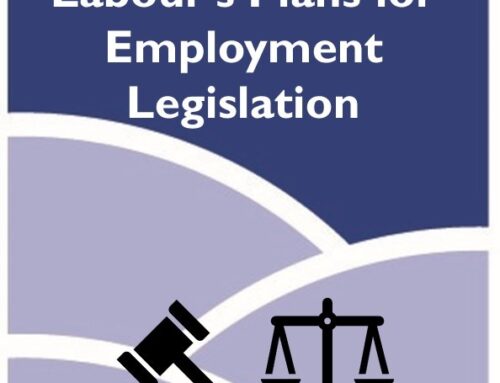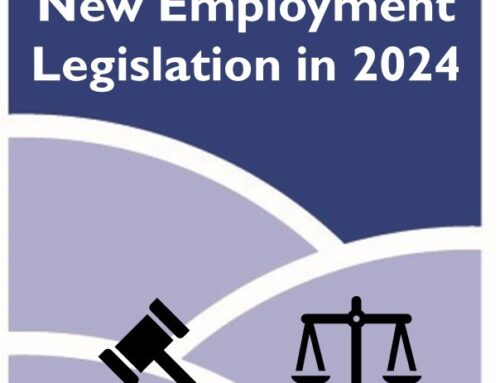The start of the new financial year is always a time when new employment legislation is brought forward and existing measures are adjusted. The Good Work Plan is a suite of measures that would have captured the headlines without the Coronavirus pandemic taking a side swipe at the country. As and when things revert to a post COVID normal this and other new legislation will be in place and must be adhered to. The Government has also enacted specific legislation in response to Coronavirus crisis.
This update outlines all the Employment Legislation changes that have come into force and also flags up a new one that will do so at a later date.
The Good Work Plan
The Good Work Plan came about as a result of the Taylor Review of Modern Working Practices in July 2017, which looked at key issues in Employment Law particularly in regard to the Gig Economy. Considered to be one of the biggest shake ups of employment law in a generation, it would have been the prime talking point with regard to legislation were it not for the COVID-19 crisis.
Most of the 53 recommendations put forward in the Taylor review were accepted in principle by The Government and some elements have already been introduced. In April 2019 the following measures were introduced:
- The right to a payslip has been extended to cover all workers – not just employees
- Payslips must now set out the hours worked for hourly-paid
- The maximum penalty for ‘aggravated breaches of employment law’ is increased from £5,000 to £20,000
The elements of The Good Work Plan that came into effect in April 2020 are:
- Right to a written statement of main terms (SMT)
Until now, employers had been required to issue new employees with a Written Statement of the Main Terms and Conditions of Employment (known as Written Particulars) within two months of starting work. As of the 6th April employees and workers are entitled to Written Particulars from day one of employment and it must contain this additional information:
- Terms relating to normal hours of work. This includes days of the week the worker will be required to work, plus whether these days / hours will vary and how the variation will be determined
- Details of any other types of paid leave, including family-friendly leave
- Duration and conditions of any probationary period
- Training the employee is entitled to or is required to complete and whether it will be paid for by the employer
- Details of other employee benefits, not just those relating to pay
There is no requirement for Written Particulars to be contained in one single document, so a combination of contract of employment, offer letter and staff handbook containing all required information being issued on day one meets these new requirements.
- Holiday pay reference periods
Previously, when working out a worker’s holiday pay entitlement, you would take the average of their previous 12 paid weeks. From April 2020 this period will be extended to 52 weeks if the individual has been employed for at least 52 weeks. For workers who’ve been with the organisation for fewer than 52 weeks, the reference period is the number of weeks they’ve been employed.
- Agency workers
This new legislation enacts a Government commitment to abolish a legal loophole known as the ‘Swedish derogation’ in the agency worker rules. This means that all agency workers will be entitled to the same pay as permanent employees after 12 weeks with the same employer.
Additionally, agency workers are now entitled to a ‘Key information’ document, specifying the following:
- The type of contract
- The minimum rate of pay
- How the individual will be paid (and by whom)
- Any deductions or fees that will be taken
- Any monetary benefit entitlements
- Entitlement to annual leave and payment
- An illustrative example of what the above means for their take-home pay
- What type of contract they are on, their rate of pay, how they will be paid and by which company
- Parental Bereavement pay and leave
From April 2020, employees who lose a child under the age of 18, or suffer a stillbirth from the 24th week of pregnancy are entitled to 2 weeks’ paid leave. This two week leave period may be taken as one block, or as two non-consecutive one week blocks, at any time during the 56 weeks following the child’s death. The leave will be paid at the same statutory rate as other family friendly rights provided the employee has 26 weeks’ service.
It is also important to remember that employed parents are already entitled, as a day one right, to take a reasonable amount of unpaid time off to deal with emergencies involving a dependent, including dealing with a dependent’s death.
- Thresholds of support for consultation rights reduced
This is an existing regulation which gives employees the right to be informed and consulted about issues in the organisation, it applies to businesses with more than 50 employees. From April 2020, the threshold for the number of employees required to instigate consultation is reduced from 10% to 2% of employees. However, there still needs to be a minimum of 15 employees to make a request.
- Future Developments
Some elements of The Good Work Plan are yet to be turned into legislation, but they have been flagged up in the Budget and other formal communications so we should expect them to be brought forward at some time in the future:
Extra statutory leave (12 weeks) and pay for all parents of premature babies needing specialist care in a neonatal unit
- Consultation on a new “in work entitlement” for employees with unpaid caring responsibilities, such as for a family member or a dependent
Employment Tribunals During Coronavirus Disruption
The Employment Tribunal system has been under strain for some time as the number of claims has increased and the number of judges has declined. So, in the majority of cases, there is a very long delay between the instigation of a claim and the actual hearing. In order to address the backlog and speed up the process during the Coronavirus disruption, the tribunal service has issued guidance that streamlines the process and allows hearings to be conducted remotely.
The guidance says that hearings may be conducted using electronic communications (including by telephone and video conferencing) where the tribunal thinks it ‘just and equitable’ to do so, in order to reduce the risks to parties and their representatives caused by having to travel to tribunals and interact with a range of individuals.
Holiday carry over extended
The government has announced a temporary relaxation of the rules on carrying over untaken holiday to the Covid-19 emergency. The Working Time (Coronavirus)(Amendment) Regulations 2020 allows workers to carry over leave they were unable to take due to the Coronavirus outbreak into the next two leave years. The relaxation of the rules only applies to the four weeks statutory leave under EU rules.
ACAS guidance says reasons for being unable to take leave could include:
- Self-isolating or being too ill to take leave
- Being temporarily laid off or ‘furloughed’
- Having to work through holidays
National Minimum / Living Wage rate increases
From 1st April 2020, the National Living and National Minimum Wage rates increased by between 4.6% and 6.5%. These are the new hourly rates by age band:
- 25 and Over £8.72
- 21 to 24 £8.20
- 18 to 20 £6.45
- Under 18 £4.55
- Apprentice £4.15
Employers should be mindful of wage rate increments that are due to staff as they move up through the age brackets in the next year.
Tribunal compensation limits
From 6th April 2020, Employment Tribunal compensation rates were increased, the new ones are:
- Limit on guaranteed payments – £30
- Limit on a week’s pay – £538
- Maximum basic award for unfair dismissal and statutory redundancy payment – £16,140
- Maximum compensatory award for unfair dismissal – £88,519
IR35 extension postponed
The planned extension of the IR35 off-payroll working rules to the private sector has been postponed for 12 months because of business uncertainty surrounding the coronavirus pandemic.
The legislation currently applies to the public sector, the extension would have made organisations responsible for determining whether a contractor carrying out work for them should be treated as an employee for tax purposes. It will be introduced in April 2021.
Tax on Termination Payments
From April 2020, termination payments over £30,000 will become subject to employer NICs, this measure was due to come into force in April 2018.



